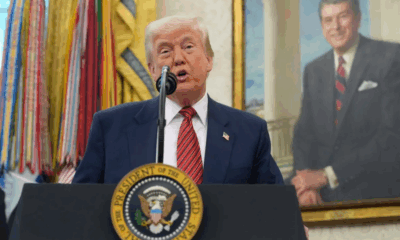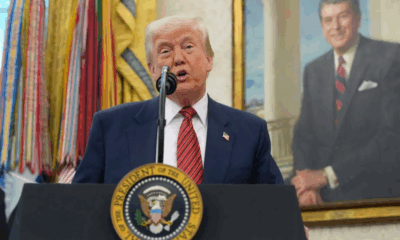Politics
Trump’s Administration Pushes Controversial DEI Revisions

The Trump administration has initiated a sweeping reevaluation of diversity, equity, and inclusion (DEI) policies across federal institutions. This move aims to reshape American historical narratives and educational content, focusing on a vision that critics argue minimizes the realities of systemic racism and the contributions of marginalized communities.
In a recent executive order issued on March 27, 2025, former President Donald Trump emphasized the need to restore federal sites dedicated to history. He stated the initiative would focus on portraying a more uplifting and patriotic version of American history, which includes revisiting the content of museums and educational institutions. Trump criticized the Smithsonian Institution for allegedly highlighting the negative aspects of slavery rather than celebrating America’s achievements.
“Federal museums should be places where individuals go to learn—not to be subjected to ideological indoctrination or divisive narratives that distort our shared history,” Trump asserted, reflecting a broader agenda to revise how American history is taught and perceived, especially concerning race relations.
According to reports from The New York Times, Trump’s administration has mandated that museums adjust any content deemed problematic within 120 days. This directive follows a pattern of attempts to sanitize American history, particularly regarding the contributions and experiences of Black Americans. Critics have raised concerns that this approach echoes historical efforts to erase uncomfortable truths about America’s past.
The National Parks Service has also been impacted by this initiative. Changes have been made to how the Underground Railroad is described on its official website, removing prominent mentions of Harriet Tubman, who had previously been featured prominently. The narrative now emphasizes “Black/White cooperation” without adequately addressing the brutal realities of slavery and the struggles faced by those who resisted it.
Such alterations to historical narratives are not limited to museums. Trump’s administration has actively sought to purge DEI policies from federal agencies, arguing that these policies violate civil rights laws and undermine national unity. The administration’s stance is detailed in its Project 2025 initiative, which outlines a framework aiming to eliminate DEI practices that Trump claims foster division rather than inclusion.
The U.S. Citizenship and Immigration Services has also introduced new guidelines that could affect immigrants’ pathways to citizenship, focusing on identifying “anti-American” sentiments. This policy raises questions about the implications for immigrants who might express dissenting views or engage in political activism.
Critics argue that these measures reflect an alarming trend toward authoritarianism, where dissent and historical truths are suppressed in favor of a homogenized narrative that valorizes a specific interpretation of American identity. Activists and educators warn that this could have lasting effects on the educational landscape, stifling discussions around race, history, and social justice.
The ongoing push against DEI has sparked significant backlash from various sectors. Educational institutions, civil rights organizations, and advocacy groups have mobilized in response to defend the principles of inclusivity and representation. As debates around these policies continue, many are concerned that the future of American democracy hinges on the ability to confront and learn from its complex history.
In the face of these developments, some individuals, such as Canadian politician Charlie Angus, have openly criticized the Trump administration’s approach, emphasizing the importance of diversity and inclusion as foundational elements of a healthy society. Angus’s remarks highlight a growing recognition that the struggle for equitable representation is not confined to the United States but resonates globally.
As the administration’s agenda unfolds, the impact on American cultural institutions and educational frameworks remains to be seen. The ongoing discourse around DEI policies will undoubtedly shape the narrative of American history and identity for years to come.
-

 Entertainment1 month ago
Entertainment1 month agoAnn Ming Reflects on ITV’s ‘I Fought the Law’ Drama
-

 Entertainment2 months ago
Entertainment2 months agoKate Garraway Sells £2 Million Home Amid Financial Struggles
-

 Health1 month ago
Health1 month agoKatie Price Faces New Health Concerns After Cancer Symptoms Resurface
-

 Entertainment2 months ago
Entertainment2 months agoKim Cattrall Posts Cryptic Message After HBO’s Sequel Cancellation
-

 Entertainment1 month ago
Entertainment1 month agoWhere is Tinder Swindler Simon Leviev? Latest Updates Revealed
-

 Entertainment2 months ago
Entertainment2 months agoMasterChef Faces Turmoil as Tom Kerridge Withdraws from Hosting Role
-

 Entertainment3 months ago
Entertainment3 months agoSpeculation Surrounds Home and Away as Cast Departures Mount
-

 World1 month ago
World1 month agoCole Palmer’s Mysterious Message to Kobbie Mainoo Sparks Speculation
-

 Entertainment1 month ago
Entertainment1 month agoITV’s I Fought the Law: Unraveling the True Story Behind the Drama
-

 Entertainment3 weeks ago
Entertainment3 weeks agoCaz Crowned Winner of The Great British Sewing Bee, Overjoyed by Triumph
-

 Entertainment2 months ago
Entertainment2 months agoAldi Launches Cozy Autumn Fragrance Range Ahead of Halloween
-

 Entertainment2 months ago
Entertainment2 months agoMarkiplier Addresses AI Controversy During Livestream Response





















